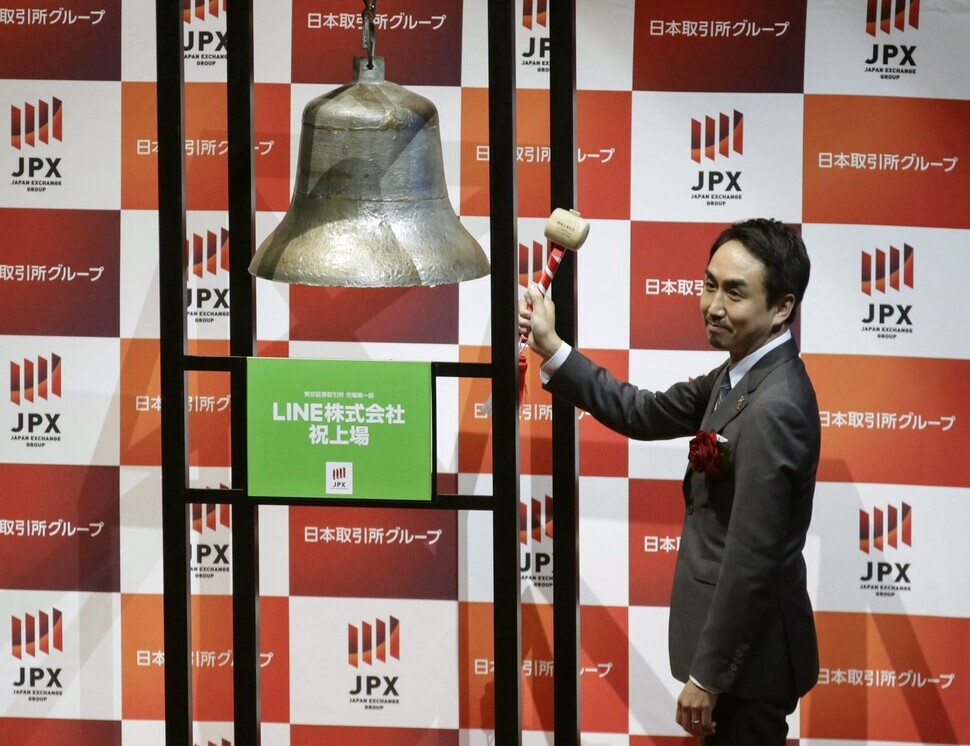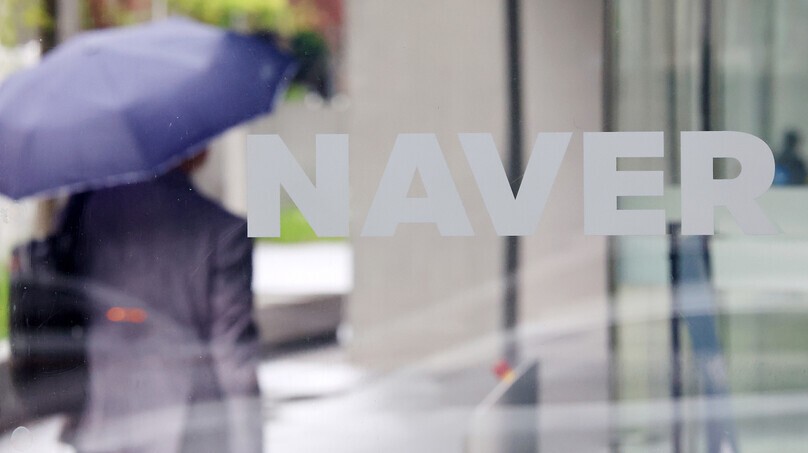hankyoreh
Links to other country sites 다른 나라 사이트 링크
Could Korea’s Naver lose control of Line to Japan?

The conservative-leaning Japanese monthly Bungei Shunju published a column in its May issue that asserted that members of parliament, public bureaucrats and soldiers in the Japan Self-Defense Forces shouldn’t use the Line messenger app. The column was an introduction to an article by Japanese journalist Kenji Minemura, “Line is Too Dangerous.”
“It’s too late to rely on LY’s self-corrective measures,” Minemura writes, referring to the operator of Line and Yahoo! Japan.
“Once again, Line is embroiled in a data breach involving servers in South Korea.”
The article all but accuses South Korea of being a data breach highway that leads to China. Referring to a 2021 data breach implicating over 100 Taiwanese politicians and government bureaucrats that used Line, the article quoted a Taiwanese source to claim that the data breach was “likely a cyber attack by China.”
“Many Taiwanese think that Line is a Japanese app,” the article went on. “Both companies and the Japanese government need to address the problem at a fundamental level.”
“Naver China is responsible for Naver’s software development and management. As long as Line and Naver utilize the same servers, Japanese users are at risk of exposure to Chinese data breaches,” the article concluded.
The Bungei Shunju is a sister publication of the Shukan Bunshun tabloid weekly. The Bungei Shunju is framing the Line data leak as a national and economic security issue.
The most popular messenger app in Japan, with 96 million users
The pretext enlisted by the Japanese government for its pressure on Naver to relinquish control of Line is a 2023 data breach that led to 520,000 items of Line users’ personal data being leaked. The company operating Line is known as LY Corp., short for Line-Yahoo, and is operated under the holding firm A Holdings. Naver and Japan’s SoftBank each hold a 50% stake in A Holdings.
A computer used by an employee at a firm contracted by Naver Cloud was infected with malware from September to October of 2023. The malware accessed Line user information through a Naver administrative account. On March 5 of this year, the Japanese Ministry of Internal Affairs and Communications issued an administrative directive calling for LY to conduct a “review of the security governance of the firm’s entire corporate network, including its parent company.”
On April 1, LY issued its countermeasures, which included separating itself from Naver and Naver Cloud’s systems and network; securing the right to inspect and audit Naver Cloud’s Korean headquarters and its facilities; establishing measures with a third party to prevent another security lapse; and conducting a comprehensive review of corporate security governance.
However, Internal Affairs Minister Takeaki Matsumoto announced a second administrative directive during a press conference on April 16, calling for “a fundamental inspection that will prevent a security relapse.” The second order was essentially a demand for a review of LY’s capital ties and its overall corporate management structure.
The Japanese government’s harsh stance against LY and Naver is inconsistent with its responses to similar data breaches involving domestic firms. In March 2023, Nippon Telegraph and Telephone (NTT), Japan's largest telecommunications firm, experienced a security breach that leaked over 5.96 million items of user data. The nature of the data breach was similar to that of Line’s: data was leaked in the process of a subcontractor trying to access the main cloud. The subcontractor vowed to upgrade its security protocols, and the Japanese government accepted this solution.
The response to the Line data breach, however, was different. It included the position that a domestic platform should not be subjected to the corporate control of a foreign entity.
Line messenger's user base in Japan rivals that of any major domestic telecommunications firm, with 96 million active users. It is effectively a national instant messaging system that is intricately linked to financial platforms like PayPay and Line Pay. Numerous mobile game developers and e-commerce firms have built businesses on Line. The interlinked nature of this system inevitably places users at risk of personal data leaks.

National security narrative
Japan has consistently expressed anxiety over Line’s user data management. In 2021, the Asahi Shimbun reported that “four Chinese engineers at a Shanghai-based affiliate that Line subcontracted to develop artificial intelligence for its services accessed the messages stored in the Japanese computer system and personal information of Line users, such as name, phone number, email address and Line ID.” At the time, LY responded by saying, “Although explanations regarding access from various global bases have been insufficient, there have been no instances of unauthorized access or user data leaks.”
“Data pertaining to user conversations, phone numbers, and email addresses are safely stored in Japan-based servers according to company protocols,” Line’s operator claimed. The incident led to the revelation that a portion of Line’s user data was stored in Korea-based servers, which stirred controversy.
LY vowed to transfer data stored in Korean servers to servers based in Japan, but another data leak occurred in 2023 during the transfer.
Many Japanese users have expressed support for SoftBank securing control over Line. A comment on a local news article read, “If they wanted to, the Koreans could simply cut off our access to Line infrastructure. It’d ultimately be the Japanese left hanging out to dry.”
Another comment read, “The media is partially responsible for contributing to Line’s reach and influence. They’ve created an infrastructure where it’s basically impossible to lead a normal life without using Line. The most viable alternative is +Message [developed by domestic telecoms], but compared to Line it’s virtually unusable.”
Looking back, the Japanese objective has been clear all along. The goal is for SoftBank to purchase A Holdings shares from Naver to secure corporate control over Line. A Holdings, a joint venture established by Naver and SoftBank, currently controls 65% of LY shares. SoftBank and Naver each hold 50% of A Holdings shares, making them co-parent firms. If SoftBank does become the majority shareholder by securing Naver’s shares, then Naver will find itself excluded from Line’s corporate governance.
During an earnings meeting last week, LY CEO Takeshi Idezawa declared, “We are making firm requests for Naver to adjust its capital.”
“I understand that Naver and SoftBank are currently in negotiations. Nothing has been finalized yet,” Idezawa added.
Idezawa clarified that negotiations were taking place “under the precondition that SoftBank becomes the majority shareholder.”
“SoftBank CEO Masayoshi Son has requested executives to take the negotiations seriously and stand firm in their positions,” Idezawa added.
In addition to Naver relinquishing its shares, there have also been calls for effectively ending technological cooperation with Naver developers.
“We will pursue phrasing out relations with Naver and its subcontractors to achieve technical autonomy,” said Idezawa.
“The goal is to reduce the role of Naver developers and Naver’s subcontractors to zero,” he added.
This is a reference to terminating LY’s contracts with Naver and Naver Cloud. LY is expected to invest around 15 billion yen (US$96.2 million) to achieve full technical autonomy over Line.
LY CPO Shin Jung-ho, a former Naver employee, recently resigned from his post as an in-house director. Shin was the only Korean on LY’s board of directors. On paper, SoftBank is already the parent company of LY, while Naver has been reduced to an affiliate. If technical cooperation and partnerships with cloud subcontractors are terminated, Naver will have little room to maneuver.
Some have resigned to relinquishing shares to SoftBank on the condition that Naver demands a control premium. But it remains unclear if SoftBank is currently capable of investing so much capital into Line.
“To secure corporate control, SoftBank needs to satisfy requirements for being able to pass a special resolution, such as by modifying bylaws, meaning two-thirds of shares. Considering this, SoftBank may try to purchase at least 15% of Naver’s shares,” said an anonymous source familiar with Naver’s internal affairs.
“Negotiations concerning the control premium for Naver’s shares will likely be intense,” the source added.
During an earnings report on May 3, Naver CEO Choi Soo-yeon called the Japanese Internal Ministry’s demands “unprecedented,” adding, “We will make our decision based on our mid- to long-term interests.”
Reevaluating Naver’s plans for overseas expansion
The ado at Line is inextricably intertwined with the intricate network of subsidiaries and affiliates that built in preparation for expanding the chat service into overseas markets like the US and Southeast Asia. LY currently holds a 100% stake in Z Intermediate Global Corporation (formerly Line Corporation). Z Intermediate effectively controls Line Plus (a Korean firm) as a subsidiary. Line Plus is an essential part of Line’s further overseas expansion.
Naver Z, which operates the company’s metaverse platform Zepeto, had also been planning on expanding into the Japanese market. Naver Z has relinquished shares to Z Intermediate Global and Line Plus, which places it under LY’s control. Naver’s plans to expand into the US, Indonesia and Thailand were based on Line’s success in Japan. This ambition would be compromised if SoftBank gained complete control over Line messenger.
By Jung Yu-gyung, staff reporter
Please direct questions or comments to [english@hani.co.kr]
Editorial・opinion
![[Editorial] Exploiting foreign domestic workers won’t solve Korea’s birth rate problem [Editorial] Exploiting foreign domestic workers won’t solve Korea’s birth rate problem](https://flexible.img.hani.co.kr/flexible/normal/500/300/imgdb/original/2024/0626/5517193887628759.jpg) [Editorial] Exploiting foreign domestic workers won’t solve Korea’s birth rate problem
[Editorial] Exploiting foreign domestic workers won’t solve Korea’s birth rate problem![[Column] Kim and Putin’s new world order [Column] Kim and Putin’s new world order](https://flexible.img.hani.co.kr/flexible/normal/500/300/imgdb/original/2024/0625/9617193034806503.jpg) [Column] Kim and Putin’s new world order
[Column] Kim and Putin’s new world order- [Editorial] Workplace hazards can be prevented — why weren’t they this time?
- [Editorial] Seoul failed to use diplomacy with Moscow — now it’s resorting to threats
- [Column] Balloons, drones, wiretapping… Yongsan’s got it all!
- [Editorial] It’s time for us all to rethink our approach to North Korea
- [Column] Why empty gestures matter more than ever
- [Editorial] Seoul’s part in N. Korea, Russia upgrading ties to a ‘strategic partnership’
- [Column] The tragedy of Korea’s perpetually self-sabotaging diplomacy with Japan
- [Column] Moon Jae-in’s defense doublethink
Most viewed articles
- 1CIA record confirms US ‘completely destroyed’ Seoul’s Haebangchon in 1950 bombardment
- 2Dispatched into unknown danger, foreign day laborers were defenseless against blaze
- 3Blaze at lithium battery plant in Korea leaves over 20 dead
- 4How 17 km of river could be a fertile bed for NK-China-Russia cooperation
- 5[Editorial] Exploiting foreign domestic workers won’t solve Korea’s birth rate problem
- 6Three expert views of the war in Gaza: From a Hamas official to Israel’s ambassador in Seoul
- 7North Korea sends trash balloons into South for second straight night
- 8[Editorial] Workplace hazards can be prevented — why weren’t they this time?
- 9North Korea, Russia are going backward into history, Yoon says of new defense pact
- 10How sanctions are backfiring to fuel a new Eurasian alliance